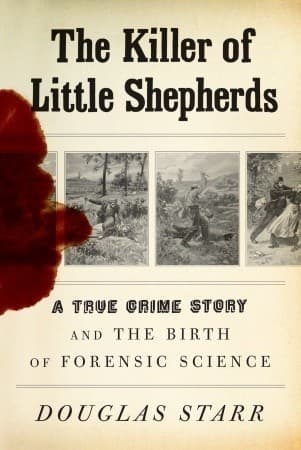
Book Review Summary: The Killer of Little Shepherds: A True Crime Story and the Birth of Forensic Science
Introduction
"The Killer of Little Shepherds: A True Crime Story and the Birth of Forensic Science" by Douglas Starr is a riveting true crime story that delves into the birth of modern forensics. Set in late 19th-century France, the book follows the infamous case of serial murderer Joseph Vacher, also known as "The Killer of Little Shepherds." Vacher terrorized the French countryside, eluding authorities for years until he met his match in prosecutor Emile Fourquet and Dr. Alexandre Lacassagne, a renowned criminologist. Starr skillfully interweaves Vacher's crime spree with the development of forensic science, exploring the early use of criminal profiling, blood-spatter evidence, and other groundbreaking techniques. This article will provide an overview of the book, introduce the author, analyze common opinions among readers, and summarize the reasons for both recommending and not recommending this captivating true crime story.
About Douglas Starr
Douglas Starr, the author of "The Killer of Little Shepherds," is a renowned science writer and professor of journalism at Boston University. He has written several books, including "Race to the Finish: Behind the Scenes of a CIA Exfiltration," which explores the CIA's secret rescue missions. Starr's expertise in science and journalism shines through in "The Killer of Little Shepherds," as he presents a well-researched and thrilling account of the birth of modern forensics.
Analysis of Views
-
Engaging True Crime Story: Many readers found the book to be an engaging true crime story that kept them hooked from beginning to end. The gruesome details of Vacher's crimes and the tense atmosphere surrounding his capture and trial made for a captivating reading experience.
-
In-Depth Exploration of Forensic Science: Readers appreciated the in-depth exploration of forensic science during the late 19th century. Starr's attention to detail in describing the early techniques used by Alexandre Lacassagne and his colleagues in analyzing crime scenes and conducting autopsies added depth to the narrative.
-
Interesting Historical Context: The book offers a fascinating glimpse into the historical context of France during the Belle Epoque. Readers enjoyed learning about the scientific achievements, social norms, and cultural aspects of the time, which added depth to their understanding of the case and its broader implications.
-
Well-Researched and Thoroughly Written: Many readers praised Starr's extensive research and meticulous writing style. They appreciated the author's attention to detail and his ability to seamlessly integrate historical events, scientific advancements, and legal proceedings into a cohesive narrative.
-
Balanced Examination of Vacher's Psychology: Some readers found Starr's examination of Vacher's psychology to be insightful and balanced. While acknowledging Vacher's monstrous deeds, Starr also explored the complexities of his mental state and the debates surrounding insanity and criminal responsibility during that time period.
Reasons for Recommendation
-
Engaging True Crime Story: The book's captivating narrative and gripping true crime elements make it an excellent choice for readers who enjoy immersing themselves in real-life mysteries. The story of Joseph Vacher's crimes and his eventual capture will keep readers on the edge of their seats.
-
In-Depth Exploration of Forensic Science: Readers who are interested in forensic science and its evolution will find this book particularly appealing. Starr's detailed descriptions of early forensic techniques and their application in real-life cases provide a fascinating glimpse into the history of criminal investigation.
-
Historical Context and Cultural Insights: The book offers a rich historical context, allowing readers to understand the social norms, cultural aspects, and scientific advancements of late 19th-century France. This added depth to their appreciation of both the case itself and its broader implications.
-
Well-Researched and Thoroughly Written: Starr's extensive research and meticulous writing style make this book an excellent choice for those seeking a well-crafted true crime story with a strong historical foundation. The author's attention to detail and ability to weave together multiple threads create a compelling reading experience.
Reasons for Not Recommendation
-
Limited Focus on Forensic Science: Some readers felt that the book's title promised more emphasis on forensic science than it actually delivered. While there are certainly interesting discussions about early forensic techniques, some felt that the focus could have been more narrowly focused on this aspect.
-
Monotonous Murder Descriptions: A few readers found certain sections of the book monotonous due to the repetitive nature of Vacher's crimes. While it is important to understand the scope of his actions, some felt that these details could have been presented in a more concise manner to maintain reader interest.
Conclusion
"The Killer of Little Shepherds: A True Crime Story and the Birth of Forensic Science" by Douglas Starr is a compelling true crime narrative that delves into the birth of modern forensics. Through the story of Joseph Vacher, a notorious serial killer in 19th-century France, Starr explores the development of forensic science during this period, highlighting pioneering techniques such as criminal profiling and autopsy analysis. The book offers readers an engaging true crime story, an in-depth exploration of historical context, and a well-researched examination of both Vacher's crimes and the advancements in forensic science that led to his capture. While some readers felt that certain aspects could have been improved, overall, "The Killer of Little Shepherds" is highly recommended for those interested in true crime stories, forensic science, and historical investigations.